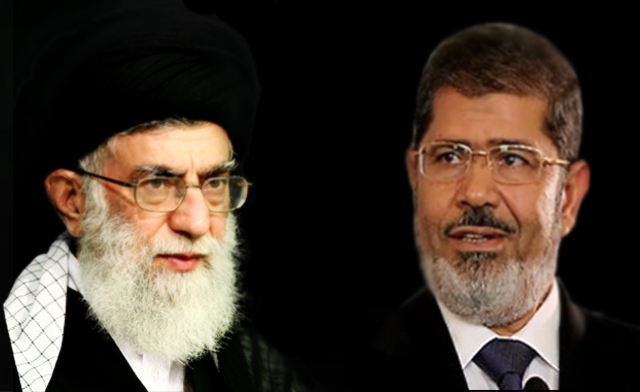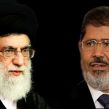
The Strategic Repercussions and Limitations of Iranian-Egyptian Rapprochement
Publication: Terrorism Monitor Volume: 10 Issue: 23
By:

The November 21 ceasefire between Israel and Hamas has been credited primarily to President Muhammad Mursi of Egypt, who, with the encouragement of the White House, brokered a peace deal between the two sides to halt eight days of military conflict (al-Jazeera, November 20; al-Arabiya, November 20; al-Masry al-Youm [Cairo], November 22). Mursi’s ability as an arbiter demonstrated that the new Egyptian President could not only work with the United States despite his Muslim Brotherhood background, but could also successfully resolve a regional conflict and play a major regional role in the Nasserite tradition alongside Turkey and Qatar (al-Ahram [Cairo], December 2). While Cairo’s successful mediation has emboldened the Muslim Brotherhood’s grab for greater power over the creation of a new Egyptian constitution, in the background another strategic shift in the regional balance of power with distinct security implications appears to be emerging: the revival of Iranian-Egyptian relations.
Cairo and Tehran severed relations in 1980, following Iran’s Islamic Revolution and a decision by the late Egyptian president Anwar Sadat to offer refuge to the deposed Shah of Iran, Mohammad Reza Pahlavi. Tehran’s later decision to name a street after Sadat’s assassin, Khalid Islambouli, continued to haunt Egyptian-Iranian relations right up to the political upheavals of the 2011 “Arab Spring.” The April appointment of an Iranian ambassador to Egypt was a strong indication that a new era in relations might be under way (Press TV [Tehran], April 18).
Further signs of a possible rapprochement appeared during the Gaza conflict with reports of Iranian military assistance to Hamas. These included unverified reports of Iran smuggling missiles to Hamas, possibly with Egyptian approval, and an announcement from Mohammad Ali Jafari, the commander of the Iranian Revolutionary Guard Corps (IRGC), that Iran had transferred technology and expertise necessary for the production of Fajr-5 missiles and smaller missiles to Gaza (al-Alam News Network [Tehran], November 21). These suggestions of military assistance were echoed in the words of Mohammad Reza Naghdi, a leading member of the Basij militia, who announced that Basiji forces were fully prepared to join the conflict in Gaza (Fars News Agency [Tehran], November 18). It is unclear to what extent Iran gave aid to the Palestinian militants, but the perception, both in the Middle East and the West, is that Iran played a major role as a provider of military equipment to Hamas.
In fact, perceptions of the military involvement of Iran in the conflict have been so pervasive that they encouraged Ali Ismail, described as a leading member of the Egyptian Muslim Brotherhood, to suggest that an alliance of Egypt, Iran and Lebanon’s Shiite Hezbollah could “annihilate” Israel (Fars News Agency, November 20). Similarly in Iran, Dr. Kazzem Jalali (spokesman for the foreign relations committee of the Iranian Majlis [parliament]) called for development of ties between Iran and Egypt as a way to resolve regional crisis in a meeting with Egypt’s interest section in Iran (Fars News Agency, December 4). The call for an alliance remarkably echoed the statement of the Hamas chief Khalid Meshaal, who thanked Egypt for its mediation efforts and Iran for arming the militant group during the conflict (al-Jazeera, November 22). But to what degree could such an “alliance” emerge with more than three decades of hostility between the two countries? Can old enemies become new friends?
Since the election of Mursi in June, the new Muslim Brotherhood-dominated Egyptian government has signaled a new direction in the country’s foreign policy. The most remarkable change has been the steady attempt to improve ties with Iran. Mursi’s historic August visit to Iran for the summit of the Non-Aligned Movement (NAM) was hailed by Iranian news agencies as a sign that Cairo is turning its back to Israel and the United States (Press TV [Tehran], August 30). During the summit, Iranian President Mahmoud Ahmadinejad described Egypt as “Iran’s strategic ally” (Mehr News Agency [Tehran], August 30). In the aftermath of the NAM summit, new political and economic negotiations over agricultural and industrial sectors were initiated between the two countries (Fars News Agency, October 21).
However, there are issues standing in the way of a full restoration of relations between Iran and Egypt, particularly those arising from a changing political landscape in the Middle East reflected in growing sectarianism and competition between regional actors such as Turkey, Qatar and Saudi Arabia, who are all vying to enhance their clout after the Arab uprisings of 2011. The key factor that has and will continue to discourage a rapprochement between Cairo and Tehran is the issue of Syria. Mursi’s denouncement of the Syrian regime during the NAM summit displayed Tehran’s inability to win over the Sunni Arab side, especially Egypt, the leading country involved in the Arab Spring uprisings that overthrew authoritarian regimes similar to the Assad government (al-Jazeera, August 30). Mursi’s anti-Assad rhetoric was also a reminder that Iran’s interpretation of the Arab Spring as “an Islamic Awakening” (as defined by the Iranian Supreme Leader, Ayatollah Ali Khamenei), is not a monolithic Islamic current and that competing state interests still overshadow utopian pan-Islamist ideals.
The rapprochement may face other challenges. Since the uprising in Syria, the Egyptian Muslim Brotherhood, Hamas, Qatar and Saudi Arabia have found a common enemy in the Syrian regime, and much of this strategic alliance revolves around sectarianism and fears of a perceived Shi’a hegemony that have haunted Sunni Arab rulers since the fall of Saddam in Iraq in 2003. Though it had maintained close ties with Damascus since 1999, Hamas’ move to Doha in February was a major upset for Tehran, a key financial backer of the Palestinian Islamic group (Khaleej Times [Dubai], February 28). Beyond the rhetoric of the Arab Spring, Hamas-Qatar cooperation in opposition to the Assad regime hints at a subtle sectarian front led by Saudi Arabia to curtail Iranian influence over the region.
However, there is one major factor that might encourage rapprochement between Egypt and Iran, and that is the possibility of a military conflict between Israel and Iran over the latter’s nuclear program. In this case it is highly possible that a strategic alliance between Cairo and Tehran could evolve with Sunni Arab regimes seeking to influence regional public opinion, which is strongly anti-Israeli. But this hypothetical situation may result only in a short-term alliance as many factors, including Washington’s influence over Cairo, may prevent this from happening.
The reality is that the Gaza conflict has, ironically, brought Mursi closer to the United States. This is a major problem for Tehran, which is preparing for a major conflict with the United States over its nuclear program. Yet tensions still persist between Egypt and Iran that find expression in incidents like Cairo’s delays in issuing permission for Iranian MPs to pass through Egypt in order to visit Gaza. These delays have angered many Iranian hardliners, who have described Egypt as playing a “devil’s game” in continuation of the Mubarak regime (Asr-e Iran [Tehran], December 3). Egypt’s continued relations with Israel, even after the Gaza conflict, have also raised new concerns among certain factions in the Iranian political establishment who criticize Mursi and Hamas for turning their back on Iran in favor of the United States or Israel (Asr-e Iran, December 2).
All in all, the future of relations between Egypt and Iran should be sought on the domestic level. While Egypt undergoes a major political transformation, with Mursi seeking to monopolize constitutional power and fight off rivals, Iran is also undergoing a major factional conflict over the limits of presidential power in light of the upcoming 2013 presidential elections. The Iranian supply of arms to various militant factions in Palestine may suggest that a faction within the Islamic Republic that actively seeks a confrontation with Israel and the United States may be pursuing a military option as a way to strengthen its political position on a domestic level. The military option could also include low intensity activities, such as arming Palestinian militants, which could nevertheless spark a major military conflict with Israel. Such a conflict could legitimize a more hardline government in Iran and marginalize the pragmatic factions within the Islamic Republic government. For Mursi, there is no military option, in particular in support of the military activities of Hamas, as it will embolden the secularists and the United States to discredit the Muslim Brotherhood as a party of radicalism rather than moderation. It is precisely because of these divergent approaches (Mursi seeking to appear moderate and Iran appearing aggressive as a way to ward off U.S. pressures) that an Egyptian-Iranian rapprochement will remain for now a distant possibility.





